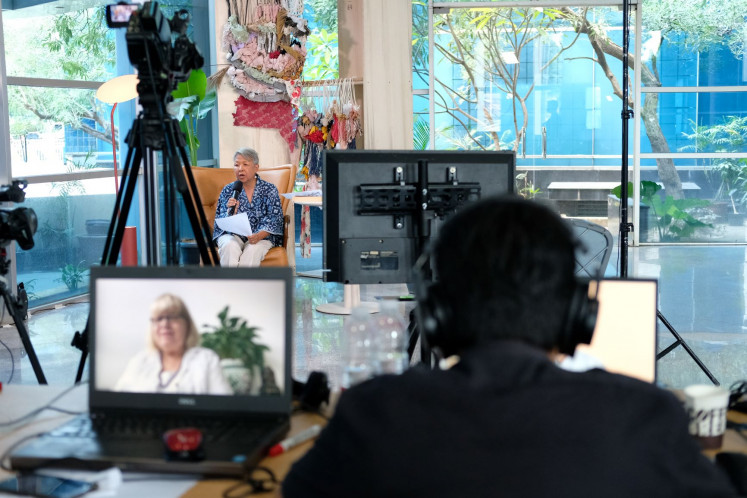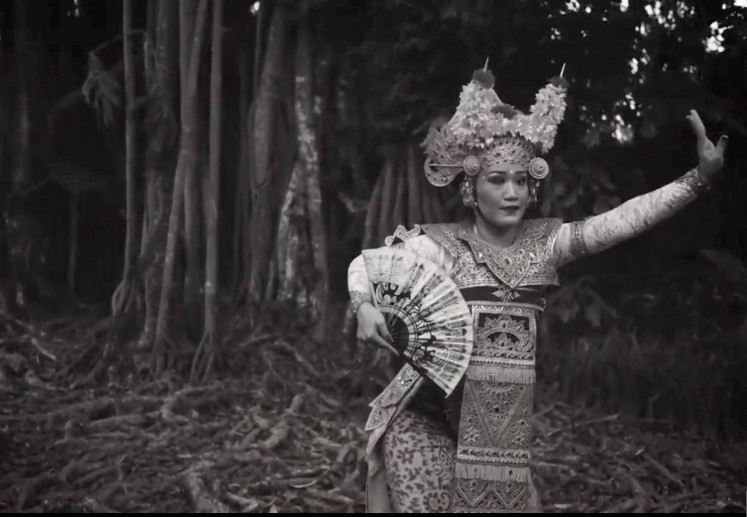Popular Reads
Top Results
Can't find what you're looking for?
View all search resultsPopular Reads
Top Results
Can't find what you're looking for?
View all search resultsOnline literary festivals connect people around the world
Apparently, literary festivals and publishing companies are not just curling up and doing nothing during the pandemic.
Change text size
Gift Premium Articles
to Anyone
Literary festivals, publishing companies and writers have quickly shifted online in the face of the pandemic.
Annual festivals such as the Makassar International Writers Festival (MIWF) in Makassar, South Sulawesi; Jakarta International Literary Festival (JILF) in Jakarta; and Bali’s Ubud Writers and Readers Festival (UWRF) did not conduct on-the-ground events this year.
Yet, they organized online dialogues and workshops addressing issues through literary works as entry points.
The MIWF has brought since June its favorite programs, comprising book talks and literary dialogues, online.
Highlights included discussions interpreting the Japanese way of life and culture through literary works, conducted in cooperation with the festival’s longtime Japan-based partner, Monkey literary journal.
Another highlight was the launch of literary works penned by writers living in eastern Indonesia, such as Anak Asli Asal Mappi: Cerita-Cerita Mini dari Papua (Mappi’s Native Children: Flash Fictions from Papua) penned by Papuan author Casper Aliandu.
The JILF, meanwhile, presented a blend of podcast series and Zoom discussions under the theme of “Heroes: (Re)making history”, tackling issues such as white/European historical hegemony and the marginalization of women as well as lesbian, bisexual, gay and transgender (LGBT) individuals head-on.
Running from Dec. 4 to 6, the festival presented, among others, Iksaka Banu, a writer known for presenting the lives of ordinary people during colonial times, historian Raisa Kamila as well as writers like Feby Indirani and Norman Erikson Pasaribu, who are both known for talking about “sensitive subjects”: Islamic fundamentalism and LGBT issues.
Meanwhile, the UWRF enlivened Indonesia’s literary, creative and activism scene with its KEMBALI2020 festival, a series of online events that also featured prominent Indonesian authors such as Agustinus Wibowo, Eka Kurniawan and Leila S. Chudori.
The festival, held from Oct. 29 to Nov 8, also presented an exclusive discussion with Australian researcher Ben Bland, who has just launched a book titled Man of Contradictions: Joko Widodo and the Struggle to Remake Indonesia via Penguin Random House in 2020. The book, which dissects President Joko “Jokowi” Widodo’s political and economic strategies, has fast become the talk of the town.
The Lontar Foundation, which focuses mainly on translating Indonesian literary works into English, also held the online Lontar Literary Festival 2020 from Nov. 11 to 15.
Taking “Menembus Batas” (Beyond Boundaries) as its theme, the festival addressed identity issues, ranging from ethnicity to gender expression and sexual orientation, featuring writers and scholars that included Soe Tjen Marching, Rain Chudori and Nuril Basri.
The MIWF’s online events attracted some 100 participants per Zoom session, while the JILF sessions attracted about 40 individuals per session. Both festivals made the events available on their YouTube channels. The JILF podcast, meanwhile, can be accessed via Spotify.
UWRF founder and director Janet DeNeefe, meanwhile, said in total, the KEMBALI2020 festival had attracted about 30,000 participants and viewers across all programs.
The Lontar Literary Festival attracted 6,000 participants from 40 countries, with a big chunk of international participants hailing from Australia, throughout the event, said John H. McGlynn, Lontar’s board of trustees chairman.
“The Subagio Sastrowardoyo book launch featuring [actress] Dian Sastrowardoyo was attended by 800 people,” McGlynn told The Jakarta Post by phone.
This year also marked the arrival of Jakarta Content Week (Jaktent), held virtually from Nov. 11 to 15, featuring 140 events and 300 Indonesian and international speakers, including Nuseir “Nas Daily” Yassin, The Inhabitable Earth – Life After Warming’s author David Wallace-Wells and Joe Sabia, creator and voice of Vogue’s 73 Questions.
Organized by the world’s largest publishing event, the Frankfurt Book Fair and 17000 Pulau Imaji Foundation, the event aimed to be a creative industry hub in the Asia Pacific and to take Indonesia’s creative industry to the global scene.
The foundation’s chair, Laura Bangun Prinsloo, said she had planned the event for the next two years, specifically in 2022 when Indonesia was set to host the 33rd International Publishers Congress. “This year’s event is the beginning of even bigger events in the future,” Laura said.
DIGITAL DIVIDE
Organizers of the festivals conveyed a similar sentiment: the audiences were so enthusiastic in discussing current issues, using literary works and writings as starting points – despite the inevitable technical problems due to limited online infrastructure.
MIWF founder and director Lily Yulianti Farid said technical glitches due to poor internet infrastructure in eastern parts of Indonesia had also opened the audience’s eyes to inequality in the country.
“Previously [during on-the-ground events], audience members would only hear testimonies from writers living in East Nusa Tenggara, for instance, about how they had to travel far to Labuan Bajo just to get an internet connection. We, who live in major cities [with proper internet infrastructure] used to take this fact for granted,” Lily told the Post in an interview on Dec. 18.
Citing an example, she said during Casper’s book launch on Oct. 17, the internet connection in Papua was so poor that Casper could not get onto the platform, forcing Lily to come up with quick solution.
“So I just gave him an international phone call from Melbourne, Australia [where I lived] and used the loudspeaker. At the same time, I also changed my Zoom account profile name and picture with Casper’s and straight away I moved the smartphone closer to the laptop, so it would look as if it was Casper who was speaking via the Zoom window,” she said.
Similarly, 2020 JILF Executive Director Avianti Armand said she also got “thrown out” of the platform while making a closing remark during the festival.
“Accidents like these couldn’t be totally prevented, since we’re totally at the mercy of our connection quality. Once my internet connection stabilized, I was able to get into the network again,” she told the Post over the phone.
McGlynn, meanwhile, said the Lontar festival, which was hosted alongside JakTent in a studio inside the SMESCO building in South Jakarta, was able to enjoy a more stable internet connection.
“The studios all had LAN, not Wi-Fi connection; plus, they paid for some extra bandwidth,” he said.
Avianti said literary festivals played a more relevant role in public life than ever with the pandemic still in full swing.
“A festival basically marks a harvest period, when we reap what we’ve sown. Literary festivals can help individuals contemplate and reflect on their actions, especially at a time of crisis when our so-called normal rhythm of life has suddenly been disrupted,” she explained.
Zoom in: Richa Kaul Padte is a writer, editor and the author of 'Cyber Sexy: Rethinking Pornography', an in-depth exploration of online sex cultures in South Asia and beyond. She was one of the speakers at the Jakarta International Literary Festival held in December. (Courtesy of JILF/-)DeNeefe said she’s always been interested in works connected to and that which resonate with Indonesia, involving marginalized communities and indigenous people to “reflect where Indonesia is right now in terms of land rights and indigenous communities”.
“The UWRF actually emerged as a response to the Bali bombings, something very tragic that impacted Bali’s financial situation adversely, so we feel like we have to rise above this and make sure we don’t go under when something like this happens,” DeNeefe said.
GOING ONLINE
Indonesia’s publishing companies have quickly turned to online platforms and e-commerce marketplaces, such as Tokopedia and Shopee, most notably, to stay afloat amid a sales decline during the pandemic.
Haidar Bagir, president director of Mizan, a publisher concentrating on Islamic books, said marketplace sales accounted for 30 to 40 percent of the publishing house’ total sales figures.
“By supplying these e-commerce marketplace platforms with original books, we can also offset the circulation of pirated books,” he told the Post over the phone.
Through foreign lens: Australian author Jennifer Mackenzie (pictured on computer) is seen in one of the discussions at the Lontar Literary Festival 2020 in November. (Courtesy of The Lontar Foundation/-)Leading publisher Gramedia Pustaka Utama (GPU) had also seen that from July and August this year, its sales figures had started to bounce back.
In May 2020, GPU marketing general manager Yola Putryanie said book sales had dropped by more than 50 percent – a decline that was buffered by a fourfold increase in online orders.
Social media officer Mia Fiona of indie leftist publication Marjin Kiri said this year it focused on its social media campaigns, especially during important dates for the progressive movement.
These occasions included the birth/death anniversaries of Argentinian revolutionary Che Guevara or German philosophers Karl Marx and Friedrich Engels, or the day of the intifada, all the while supporting the local 16-day antisexual violence movement.
NEW TITLES
New literary titles continued to hit the shelves, including Sambal dan Ranjang (The Chili Sauce in our Bed), a debut short story collection by Tenni Purwanti; and Norman’s new short story anthology Cerita-cerita bahagia, hampir seluruhnya (Happy Stories, Sort of), both via GPU.
Meanwhile, Kepustakaan Populer Gramedia published Pratiwi Juliani’s novel Debu dalam Angin (Dust in the Wind) and Rio Johan’s novel Buanglah Hajat pada Tempatnya, which translates as “use the proper place to poop”.
Bentang Pustaka, meanwhile, published Feby’s second anthology Memburu Muhammad (Hunting for Muhammad).
Creative endeavors: A series of online events was the highlights of the KEMBALI 2020 festival which aim to showcase Indonesia’s cultural diversity. It was initiated by Yayasan Mudra Swari Saraswati, foundation behind Ubud Writers & Readers Festival which did not hold events this year. (Courtesy of Mudra Swari Saraswati Foundation/-)Feby said separately the book’s first draft was completed last year during her studies in London but did not have time to revisit it for some time, having been overwhelmed by her dissertation. In July, it was confirmed that the book would be published this year.
“I was happy but felt like I would need to put in extra effort to deal with all the nitty-gritty of refining the craft, especially when I didn’t feel grounded with all the turbulence in and around me,” Feby said through email.
“It was indeed a rather challenging process of re-editing, rewriting and even dropping some stories and replacing them with new ones that were inspired by and dedicated to this pandemic.”
Her friends suggested it was probably not a good idea to launch her book this year, with most physical stores closed. On the other hand, she noticed how online bookshops had built engagement with their audiences.
“So I just placed my bet on it,” Feby said, adding that so far, the result has been quite uplifting.
“Besides, I want to bring something to Indonesian readers, something that doesn’t have to be all pandemic related since we still have to deal with existing problems like discrimination against minorities and uncritical thinking that benefits the prevailing powers.”















